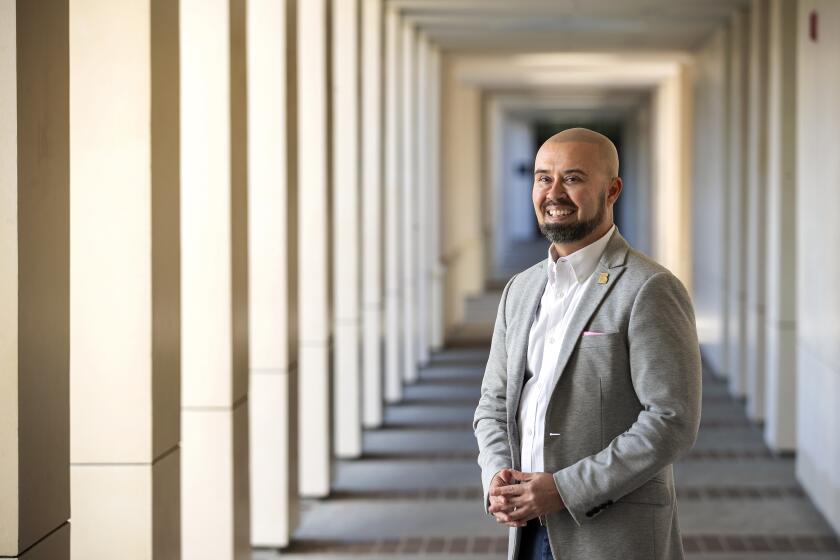State Report Urges Return to Basics in Teaching Reading : Education: Panel calls progressive methods a failure that could doom children economically and socially. The recommendations may have dramatic national impact.
Labeling a nearly decade-long experiment in progressive teaching methods a failure, a state task force today will call on California schools to resume teaching phonics, spelling and other basic reading skills.
“There is a crisis in California that demands our immediate attention,” the task force says in a report to be released today, warning that unless reading is taught differently, “we will lose a generation of children” who will be doomed to academic and social failure.
The task force report, which was obtained by The Times, urges a kindergarten-to-university overhaul of teaching methods, textbooks and teacher training to ensure that all children are reading independently no later than the end of third grade.
Appointed last spring by state Supt. of Public Instruction Delaine Eastin in response to California’s bottom-of-the-barrel performance on national tests, the task force repudiates the extremes of the “whole language” philosophy that--with the state’s leadership--has gained great influence in classrooms nationwide.
The report adds to a building backlash against the claim of whole language purists that children learn to read as naturally as they learn to talk, as long as they are steeped in rich, exciting stories.
Eastin also appointed a task force to re-examine the methods used to teach math. Eastin plans to announce the findings of the task forces, as well as her response, at a news conference this morning.
Because California and Texas, which already has ordered the reintroduction of phonics and basic skills, are the largest textbook markets, the task force report could have a dramatic impact on how reading is taught nationally, observers said.
“It’s going to have a major effect,” said Patrick Shannon, a professor at Penn State University who supports the whole language concept that the task force rejects.
Although praising that method’s focus on literature, the task force report says that most children need to be systematically taught phonics, letter patterns and other “decoding” skills that enable good readers to recognize words virtually automatically.
That idea--that skills need to be taught explicitly, directly and systematically--was all but eliminated the last time the state revamped its approach to reading, in the much-acclaimed but controversial 1987 state “framework” for reading and language arts.
“I feel like we have pushed the rock over the top of the mountain,” said Marion Joseph of Palo Alto, a former top state education official who served on the task force.
Joseph, who has been campaigning for changes in reading instruction methods for several years, said the task force’s approach does not amount to a back-to-basics move but rather draws on the latest and best thinking. “We’re talking about setting California’s course based on the results of the research,” she said.
In retrospect, many educators involved in writing the 1987 framework, including then-state Supt. of Public Instruction Bill Honig, said this week that their efforts were misinterpreted and that school districts and teachers should not have eliminated skills instruction.
But many teachers said they were told in no uncertain terms that “if you used phonics you were behind the times,” said Allen Felton, a Davis fourth-grade teacher who served on the Eastin task force.
The result, according to a critique in the current issue of the American Federation of Teachers’ journal, is that millions of youngsters nationwide were surrounded by “beautiful pieces of literature that [they] can’t read” and eventually will be denied entrance into the economic mainstream.
Researchers say students who are learning to speak English while in school and students whose parents did not read to them extensively before kindergarten are hurt the most.
The frustration of students taught with the whole language method was obvious last year in the faces of her first-graders, said Tammy Hunter-Weathers, a teacher at Hyde Park School in the Crenshaw area of Los Angeles. “The children were in tears,” she said, when they were asked to read texts even though they did not know the letters or sounds. “They look at you with three paragraphs on a page and they say, ‘What do we do with this?’ ”
The 27-member task force, made up of university professors, teachers, administrators, parents and business leaders, is calling on Eastin to have the framework that guides the teaching of reading rewritten to restore a balanced approach that combines skills and interesting stories.
Task force members said their biggest struggle was to produce a statement that avoided the extremes of either methodology, while addressing the serious flaws in the state’s approach to reading.
“Our job as teachers is to support whatever kids need and to figure out how to give it to them,” Felton said.
In addition, the task force report says teachers need more than one course in how to teach reading before getting their state credential. Among other recommendations, the task force says students who fall behind need quick attention from the best teachers; school libraries and classrooms need more books, and learning to read--the skill that makes all other learning possible--must come before all else.
Reading is so important, the report emphasizes, that the recognition of letters and their sounds should be taught beginning in preschool. Language and reading should take up as much as a third of the day in kindergarten and as much as half of the day through third grade, even if it takes time away from other subjects, the panel urges.
In addition, the 27-page report recommends that class sizes be 20 or smaller through grade three to allow teachers more time to address the needs of individual students.
California’s poor test scores, which ranked behind Louisiana as the lowest of all the states participating in the 1994 National Assessment of Educational Progress, as well as longstanding complaints from legislators, parents and teachers, almost guarantee that the report will have an impact.
The state Legislature has already sent to Gov. Pete Wilson bills requiring the State Board of Education to choose textbooks that focus on basic skills such as spelling and phonics. Earlier, the state’s curriculum commission, which writes specifications for textbook purchases, made a similar demand to apply to new books to be selected in 1996. The influential California School Boards Assn. also published a report this year demanding the restoration of phonics instruction.
Finally, Honig, who oversaw the writing of the 1987 framework, published a book this summer that amounts to almost a confession that he was misguided.
The framework’s teaching methods are the reason that 30% to 40% of students in high-poverty areas never learn to read and even higher percentages are not able to keep up with the demands of reading increasingly difficult materials as they go through school, Honig wrote. The only disability of most students labeled learning-disabled, he added, is they weren’t taught reading skills.
But whole language theorists interpret the research and the drop in test scores differently and say the task force’s new perspective is motivated by conservative politics, rather than good research. Although conservatives have long advocated more focus on basic skills, several leading figures on the task force, as well as Eastin, are Democrats.
“The problem is not in how we’re teaching,” said Carol Jago, a Santa Monica teacher who heads the California Literature Project at UCLA, a state-funded effort to help middle- and upper-grade teachers implement the 1987 framework. “The problem is we have 39 kids in a classroom, 60% of the students don’t speak English, and we don’t have the resources to give them the support they need to give them the literacy to be able to score well in the fourth grade.”
Stephen Krashen, a USC professor who is one of the leading figures in the whole language movement, said many teachers will resist the changes recommended by the task force. “There’s a wide number of teachers who have seen whole language work and work effectively and these are not the ones . . . on the reading task force,” he said.
But Gayle Cloud, a Riverside parent and credentialed teacher, said the new report validates the concerns of many parents. She said complaints to her school district about a lack of phonics were ignored. The situation has “generated a lot of mistrust for a system that is failing to educate our kids,” she said.
Dennis Parker, the manager of language arts for the state Department of Education and a key figure in the 1987 framework, said that document never intended to eliminate skills. But they were, he said, because the state did not train teachers in the new methods.
Even now, he said, only 2% of the state’s teachers have been exposed to whole language principles and the state Department of Education is still compiling a book of sample lesson plans.
“My biggest fear is that the task force report may be misunderstood to mean that if you just put skills back into the reading program . . . you’re going to solve our problems and, in my way of thinking, it is not going to be enough,” Parker said.
The task force report does not make specific recommendations about how much time should be spent on phonics or other skills. Rather, it lays out a model for what skills should be taught when and urges every school district in the state to come up with a plan on how to cover that ground and how to measure students’ progress.
More to Read
Start your day right
Sign up for Essential California for news, features and recommendations from the L.A. Times and beyond in your inbox six days a week.
You may occasionally receive promotional content from the Los Angeles Times.






